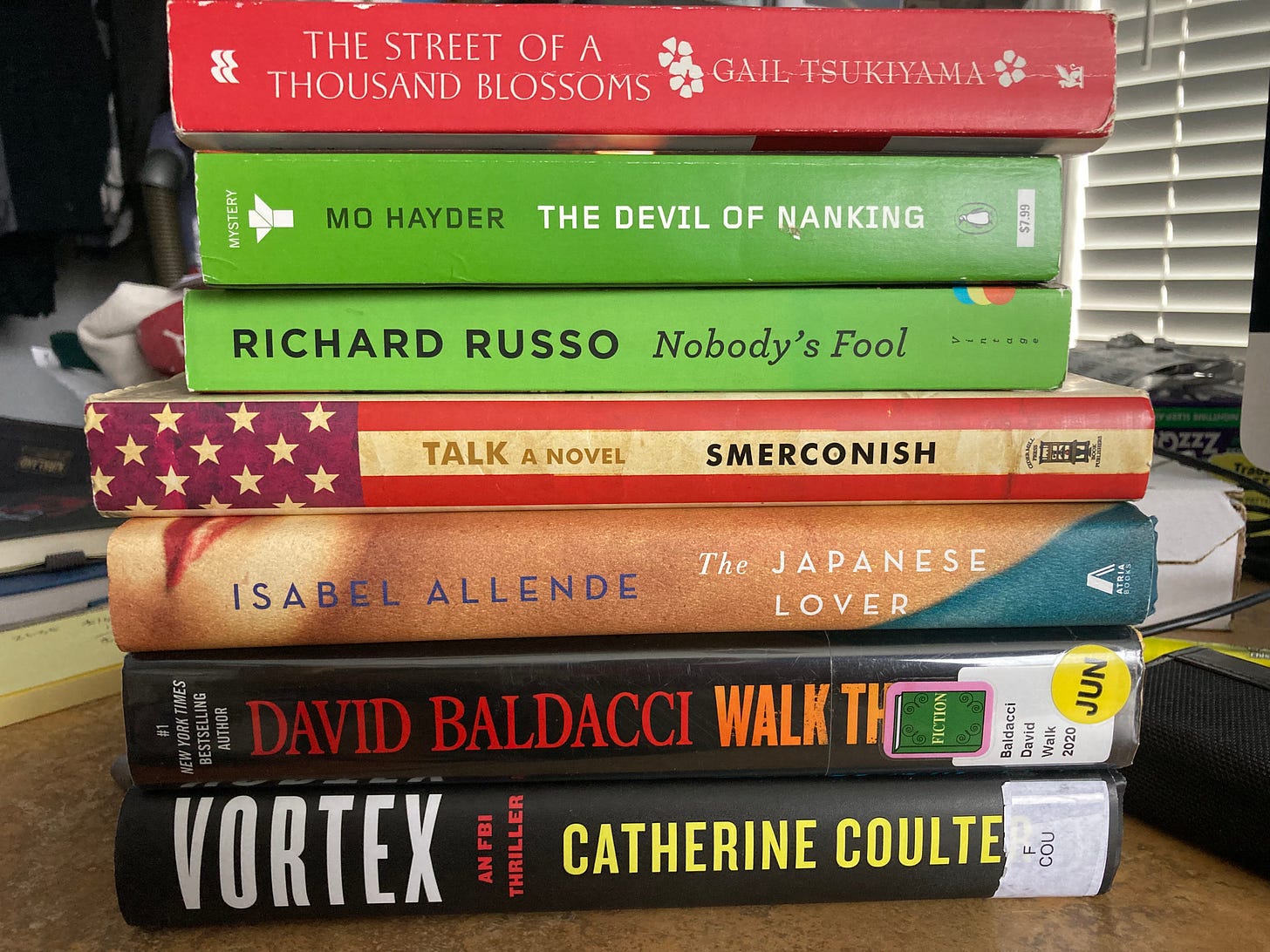Hooking Readers from the Start
How First Impressions in Books Capture Readers and Why Authors Obsess Over Them
How do you get someone to read or buy your book (assuming you’re an author)? By having an engaging and provocative opening page. This is why authors spend an inordinate amount of time polishing, revising, rewriting, editing, and then revising yet again their opening few paragraphs.
Over the weekend my wife and I went to a pair of library book sales. Salem and Keizer Libraries had sales over the weekend, and it’s a great place to grab a few bags of books for pennies on the dollar. As I looked over the collection of books we snared, I thumbed through many of them to review the opening few paragraphs.
As a reader, I want to know what I’m getting into when I start a book. As a writer, I want to write a compelling opening chapter that sets the stage for the book but, more importantly, tells the reader what they’re in for.
With that in mind, I randomly chose seven books from the book sale to inspect their opening pages.
Vortex
Let’s start with “Vortex,” by Catherine Coulter, billed as “An FBI Thriller.” I might have heard the author’s name, but I’m sure I haven’t read any of her works. Here’s the opening:
A full moon cast pale shadows over the two men digging and flinging dirt out of a hole, their movements rhythmic. The moonlight was bright enough they could see the small pebbles in each clump of dirt, see each other's sweaty dirt-streaked face.
Snake stopped digging, swiped the back of his hand over his eyes. "I'm tired. Can we give it a rest a minute?" He eyed his best friend, let the words pour out. "It shouldn't have hap-pened, man. She was a gamer, like us, and when I told her my handle was Snake and yours was Dante, she laughed, told me she loved World of Warcraft. Her online handle was CoolGir|34, she told me, and then she leaned up and whispered to me she liked to call herself Aolith the dreamer because the name was so magical. I never even found out her real name.”
The following paragraphs tell you that these two characters are digging a hole to bury a body. We learn that they drugged the girl at a party with the intent of sexually assaulting them, but something goes wrong; she dies, and they are now burying her to hide their involvement. As I read the first chapter, I was struck by the amount of information we learned simply through dialogue. I felt that much of it felt inauthentic, that people wouldn’t talk that way, and if I had written it, I’d have used exposition more than relying on dialogue. Still, out of all of the books this weekend, this is the one that I decided I’d read first.
Walk the Wire
Up next, David Baldacci’s “Walk the Wire,” published in 2020, is another in his series featuring Amos Decker, the man with the perfect memory in a thriller set in North Dakota.
HAL PARKER WAS RESOLUTELY closing in on his prey, and he felt his blood pressure amp up with every firm step he placed into the dirt. He could tell he was nearing his target by the frequency and volume of blood that had fallen onto the darkened ground, like dulled rubies scattered in the rich soil. He had obviously wounded rather than killed his quarry.
A carcass delivered was part of the deal if he was to earn his fee.
He was heartened by the blood loss. It evidenced the inevitable, especially in an unforgiving climate like this.
He moved slowly and methodically forward. Fall was nearly here, but summer was still hanging on, dragging its heat-flamed and moisture-rich knuckles across the stark tundra. Right now, he felt like an egg in a heated skillet. If it were winter, he would be encased in special clothing, and Parker would never, under any circumstances, start to run after his prey. If you ran when it was fifty degrees below zero, your lungs would hemorrhage and you'd drown in your own engorged corpuscles.
I’ve read three or four David Baldacci books and enjoyed them all. His first, “Absolute Power,” was made into a movie starring Clint Eastwood, and it started Baldacci off onto a prolific career of crafting thrillers and suspense novels. I read Absolute Power a couple of years ago and thought large parts of the book were poorly written. But his writing has improved since then!

The Japanese Lover
Published in 2015, “The Japanese Lover” by Isabel Allende is the 18th book by the Chilean author. The 82-year-old has won the National Prize for Literature and the Presidential Medal of Freedom and is well-regarded in the literary world. Here are the opening words:
When Irina Bazili began working at Lark House in 2010, she was twenty-three years old but already had few illusions about life. Since the age of fifteen she had drifted from one job, one town, to another. She could not have imagined she would find a perfect niche for herself in that senior residence, or that over the next three years she would come to be as happy as in her childhood, before fate took a hand. Founded in the mid-twentieth century to offer shelter with dignity to elderly persons of slender means, for some unknown reason from the beginning it had attracted left-wing intellectuals, oddballs, and second-rate artists.
Lark House had undergone many changes over the years but still charged fees in line with each resident's income, the idea being to create a certain economic and racial diversity. In practice, all the residents were white and middle class, and the only diversity was between freethinkers, spiritual searchers, social and ecological ac-tivists, nihilists, and some of the few hippies still alive in the San Francisco Bay Area.

In the opening pages, you get a good sense of what the novel will be like: a character-driven story with perhaps a focus on introspection, connections, and societal norms. I may have read an Isabel Allende novel sometime in the deep past, but I can’t be sure. I look forward to reading this one. Her stories are not the kind I usually read, but when I do spend the time, I tend to enjoy them a lot.
Talk
“Talk” by Michael Smerconish, published in 2014, explores the rise of a conservative talk show host, Stan Powers, who must decide whether to continue parroting talking points or stay true to his beliefs. When I picked up the book and read the description, I immediately thought of the 1988 Oliver Stone movie Talk Radio, loosely based on the assassination of Denver radio talk show host Alan Berg in 1984. Also, as a guy who has spent decades behind a radio microphone and worked as a talk show host fill-in, the topic interested me. Here’s the opening:
"Fire, tits, and sharks are TV gold. But on radio you need to make 'em hot the harder way. Through the ears."
Welcome to the media world according to Phil Dean. The new year had just begun, we'd only been connected for five minutes, and already he was on a roll.
I'd called him on my iPhone just as soon as I'd cleared the shitty mobile reception of the underground lot at Whiting and Ashley beneath the radio station where I work in downtown Tampa. It was our first skull session since before Christmas break, but there was no holiday rust apparent in his rapid-fire delivery.
So far his advice for the coming year sounded pretty much the same as ever. My hunch was that he was about to hit me with his 3C mantra, and sure enough, it came in his next sentence.
"Remember Stan, the three C's are still king...." I finished the sentence for him, pulling his chain.
"Compelling, compelling, compelling."
While you may not get the gist of the story in the opening paragraphs, you definitely get the idea of what you’re in for: rapid-fire narrative, sharp humor, and a story set in the media world. I look forward to reading this one. Merconish, if you haven’t heard of him (I hadn’t until seeing this book), is a controversial figure who was a registered Republican until 2010, when he registered as an Independent. On his Wikipedia page, there’s a lot to unpack.
Nobody’s Fool
Richard Russo’s novel was published in 1993, won a Pulitzer Prize, and was made into a movie starring Paul Newman. Not a bad trifecta! I picked it up because I’d never read anything by Russo and also because I loved the movie; it was one of Newman’s best, one that came late in his career. Here’s the opening:
Upper Main Street in the village of North Bath, just above the town's two-block-long business district, was quietly residential for three more blocks, then became even more quietly rural along old Route 27A, a serpentine two-lane blacktop that snaked its way through the Adirondacks of northern New York, with their tiny, down-at-the-heels resort towns, all the way to Montreal and prosperity. The houses that bordered Upper Main, as the locals referred to it— although Main, from its "lower" end by the IGA and Tastee Freez through its upper end at the Sans Souci, was less than a quarter mile-were mostly dinosaurs, big, aging clapboard Victorians and sprawling Greek Revivals that would have been worth some money if they were across the border in Vermont and if they had not been built as, or converted into, two- and occasionally three-family dwellings and rented out, over several decades, as slowly deteriorating flats. The most impressive feature of Upper Main was not its houses, however, but the regiment of ancient elms, whose upper limbs arched over the steeply pitched roofs of these elderly houses, as well as the street below, to green cathedral effect, bathing the street in breeze-blown shadows that masked the peeling paint and rendered the sloping porches and crooked eaves of the houses quaint in their decay.
With an opening like this, the reader would likely expect a novel about a small town in America with a strong sense of place. The details imply that the town might play a key role in the narrative. We haven’t met a character yet, but the first words imply a reflective, possibly bittersweet novel, emphasizing setting, character, and the passage of time. The tone hints at themes of aging, loss, and the complexities of life in a small town, where change comes slowly, and decay is ever-present. Can’t wait to read this one!
The Devil in Nanking
Published in 2004, it’s a crime novel by Mo Hayder that was originally published under Tokyo. It delves into the history of Japan and China in the late 30s, a time and place that fascinates me. Here are the opening words:
Sometimes you have to really make an effort. Even when you're tired and hungry and you find yourself somewhere completely strange. That was me in Tokyo that summer, standing in front of Professor Shi Chongming's door and shaking with anxiety. I had pressed my hair down so it lay as neatly as possible, and I'd spent a long time trying to straighten my old Oxfam skirt, brushing the dust off and ironing out the travel creases with my palms. I'd kicked the battered holdall I'd brought with me on the plane behind my feet so it wouldn't be the first thing he saw, because it was so important to look normal. I had to count to twenty-five and take very deep, very careful breaths before I had the courage to speak.
'Hello?' I said tentatively, my face close to the door.
'Are you there?'
I waited for a moment, listening hard. I could hear vague shufflings inside, but no one came to the door.
First off, I like first-person narrative as it brings a different point of view than most novels. There is also a sense from the narrator of her being way out of her depth, clearly out of their element, what with the flustered situation she finds herself in. By reading the back of the book, you know that the main character is in Japan looking for a rare piece of footage of the 1937 Nanking Massacre, and with the opening pages, it’s a compelling start to what I suspect will be an entertaining novel.
The Street of a Thousand Blossoms
I know nothing of Gail Tsukiyama, the author, but the description of the book on the back told me that it takes place in Tokyo in 1939, where two orphaned boys dream of a future rooted in tradition. But they must put their dreams on hold when the war comes and forge their own paths. Here’s the opening:
A white light seeped through the shoji windows and into the room, along with the morning chill. Except for the futon he slept on and a teakwood desk, the pale, spacious room was empty.
Hiroshi Matsumoto breathed in the grassy fragrance of the tatami mats, the sweet and stirring February air, his thoughts wandering to the cherry blossoms that would soon be poised like flakes of snow upon their branches. The trees that lined the streets of Yanaka would be in full bloom, and the labyrinth of narrow alleyways would swarm with tourists stopping to admire the Japanese quince, daf-fodils, and blue triplet lilies blossoming in flower boxes that crowded the teeming walkways. As boys, he and his brother, Kenji, had pushed single file past the old wood and stone houses to the park.
Now, there were few of the old buildings left, long since having been replaced by brick and concrete ones. Despite the sharp edge of memories that stabbed him just below his rib cage, he still loved this season best, just as Aki always had-the doorway to spring with each morning gleaming with new possibilities.
With an opening like this, and the story being set in Tokyo in the late 30s, and knowing the history of Japan and the world in the 40s, we can expect a novel that delves into the inner life of its characters, particularly Hiroshi, as they navigate personal history, cultural shifts, and the inevitable passage of time. The tone is reflective and poetic, suggesting a novel that will be emotionally rich and perhaps meditative in nature, with a strong sense of place and seasonality woven into the narrative. There is some definite bittersweet aspect going on here, and I think we can expect themes of love, loss, or longing as playing a central part.
My Own Opening Lines
If you’ve paid attention to the handful of times I’ve discussed my attempts at writing novels in this publication, you’ll know I’ve been at it for five years as of this month. Yup, it was October 2019 when I ran out of excuses and started pounding away at the keyboard. I’ve learned about the intricacies of crafting a novel: inciting incidents, rising action, the story's climax, character development, dialogue, exposition, and so much more. It’s been an ongoing education, much like a self-directed college course.
And, of course, opening words.
Here are the first few paragraphs from the novel I’m working on, Forged in Ancient Fire. I still plan on publishing it, hopefully in the not-too-distant future! It’s a work-in-progress, and I am making progress, even though it’s moving slow. But hey, I want to get it right!
This is a more extended excerpt than the earlier examples, but I wanted to include the section that tells the reader that something is going on that the protagonist, Jia, doesn’t understand.
Bananas. Always bananas.
Every morning, for as long as Jia could remember, her mother would stand at the kitchen counter slicing a banana for breakfast. The musical plonk of the slice hitting the ceramic bowl usually reassured her that things were normal.
Plop, plop, plop, plop.
Her mother would add yogurt, berries, and granola and eat while going over that day’s lessons, correcting papers, balancing the checkbook, or whatever else adults did.
Every single fucking day. Her mom always ate the same thing, while Jia vacillated between a depressing variety of choices: toast, a Pop-Tart, yogurt, orange juice, frozen waffles. Anything but yogurt or bananas. Ugh.
Years ago, Jia had asked her mother why she ate the same thing every morning.
“It’s one less thing to think about. I have too much else to do, so this makes breakfast easy. Besides, I like fruit and yogurt.”
Bananas. Plop, plop.
Sometimes the plops were evenly spaced, rapid-fire. On rare occasions, the plops were spaced out, uneven, and that told Jia that something was on her mother’s mind. In the past few months, that had been the case.
If only she could sit with her mother now and listen to the banana slices hit the bowl. But that was over for good.
The memory slipped away, and Jia turned to stare at the principal, who seemed be droning on at an extremely slow pace. This memorial for her mother was moving at a snail’s pace, but her mind was going a thousand miles an hour (or, as she quickly did the math, 1,609 kilometers per hour).
For a brief moment, she stared blankly at Mr. Snyder, trying to understand his words.
“Sandy O’Conner, English teacher, friend, loving mother, loved and respected by all, will be sorely missed here at Concord High School….”
She closed her eyes, and the sounds of the school gymnasium echoed through her brain.
A flash of light caused her to snap her eyes open. The overhead lights flickered from bright to dim several times. Jia looked around to see the audience’s reaction, but there was none. It was as if only she could see what was happening. Her heart skipped a few beats as she reached under her t-shirt and lightly touched the Triquetra amulet her mother had given her only three hours and 48 minutes before she died. It grew warm against her skin as the lights continued to flicker.
As she grasped the amulet, the gymnasium, filled with random murmur of the students and teachers and the amplified speech of Mr. Snyder, suddenly became eerily silent. Time seemed to slow down as the noise dimmed, and for a brief moment, a clear, melodic voice, soft but unmistakable, whispered her name as if carried on the wind from afar.
“Jia….”
The voice was filled with warmth and an undercurrent of power, and it felt both foreign and familiar. As quickly as it came, the sickening feeling, along with her super senses, and the perception that time had slowed down, passed.
She felt her shoulders tighten and shiver, as the background noises returned, leaving Jia with the feeling that the world she now lived in held even more mysteries than she imagined.
The sound of the voice, which might — or might not — have been her mother’s, took Jia back to the last thing she and her mother had talked about before she had died, which was now 119 hours and 36 minutes ago.
“You need to find your father—” her voice weak.
Let me know what you think!





